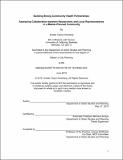Building strong community health partnerships : assessing collaboration between researchers and local representatives in a master-planned community
Author(s)
Taylor-Hochberg, Amelia.
Download1140072624-MIT.pdf (6.701Mb)
Alternative title
Assessing collaboration between researchers and local representatives in a master-planned community
Other Contributors
Massachusetts Institute of Technology. Department of Urban Studies and Planning.
Advisor
Mariana Arcaya.
Terms of use
Metadata
Show full item recordAbstract
Health is a social and environmental phenomenon. An understanding of cities as platforms for the social determinants of health, and the emergence of the Healthy Cities movement, support the characterization of urban planners as stewards of health. One way that cities can seek to understand and plan for the complexities of urban health systems is through community-based research initiatives, that pair local representatives with health researchers. Through research and community engagement, these Community-Health Partnerships (CHPs) can then provide both information and guidance regarding the health implications of future kinds of development. This kind of embedded health research is considered to produce more reliable and actionable research findings, through an increased understanding and incorporation of the local context. However, how these CHPs emerge and become situated in a community is not well understood. How do collaborations between community stakeholders and health researchers come to be? What makes them strong candidates for successful health research? And how are those relationships mediated by local factors? This thesis interprets the collaborative style and processes adopted within the earliest phases of one community health partnership (CHP) in a master-planned community, through the lens of Community-Based Participatory Research (CPBR). Before a formal partnership structure had been adopted, researchers from the imminent CHP reached out to DUSP to assist in articulating the potential opportunities and barriers unique to their intended research context. This thesis's research was conducted for the partnership's use, in order to make recommendations for improving their collaborative processes in pursuit of their future goals. Lessons learned within this partnership's collaborative structure are then reflected upon in terms of how they might inform successful CHPs generally, with particular attention paid to the role of master-planned communities.
Description
This electronic version was submitted by the student author. The certified thesis is available in the Institute Archives and Special Collections. Thesis: M.C.P., Massachusetts Institute of Technology, Department of Urban Studies and Planning, 2019 Cataloged from student-submitted PDF version of thesis. Includes bibliographical references (pages 84-88).
Date issued
2019Department
Massachusetts Institute of Technology. Department of Urban Studies and PlanningPublisher
Massachusetts Institute of Technology
Keywords
Urban Studies and Planning.